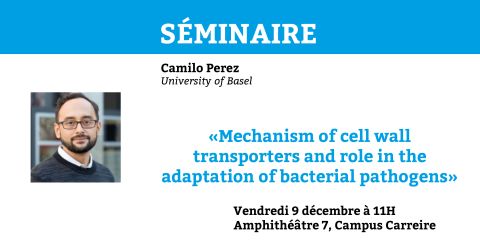"Mechanism of cell wall transporters and role in the adaptation of bacterial pathogens"
Bacterial infections represent a major public health problem augmented by the increasing occurrence of strains resistant to antibacterial agents. Gram-positive bacteria such as Staphylococcus aureus and Streptococcus pneumoniae are leading pathogens causing nosocomial and community-acquired infections. The bacterial cell wall is a complex structure that exerts fundamental protective functions against host defenses and antibiotics, contributing to bacterial survival and adaptation under adverse conditions. Teichoic acids are distinctive biopolymers found in the cell wall of Gram-positive bacteria. They play essential roles in immune evasion, adhesion, biofilm formation, and protection against antimicrobials. Multiple membrane transporters are key players in the biosynthesis pathways of teichoic acids, participating in the translocation of lipid and water-soluble precursors and translocation of fully assembled cell wall components. My lab is interested in understanding the mechanism of these proteins and in revealing their contribution to bacteria adaptation strategies. We use a combination of X-ray crystallography, single-particle cryo-EM, Solid-Supported-Membranes electrophysiology, nanobodies selection, and several biochemical and biophysical in vitro assays. Recently my lab revealed previously unknown architectural features of multiple cell wall transporters, described their molecular mechanisms, and their role in bacteria adaptation to stress conditions.
-------------------------------------------------------------------------------------------------------------------------------------------------
Biography: I studied for a Diploma in Chemistry and a Master's in Biochemistry at the National University of Colombia. I then moved to Germany, where I obtained a Ph.D. in structural biology of membrane proteins at the Max Planck Institute (MPI) of Biophysics. There, I worked in the group Prof. Christine Ziegler, on the mechanism of an osmo-regulated secondary transporter. In 2013, I joined the laboratory of Prof. Kaspar Locher at ETH Zürich as postdoctoral researcher. At ETH, I investigated the mechanism of the ABC transporter flippase PglK, involved in protein N-glycosylation in the bacterial pathogen Campylobacter jejuni. In 2017, I obtained an SNSF Professorship to establish my research group at Biozentrum of the University of Basel. In 2020, I was awarded the EMBO Young Investigator Prize. My lab aims to understand the mechanistic basis of adaptation strategies of bacterial pathogens. We want to reveal how the activity of cell wall membrane proteins contribute to cell wall remodeling and the scavenging of resources in host environments. To answer these questions, my Lab combines single-particle cryo-EM, X-ray crystallography, SSM-electrophysiology, selection of nanobodies, multiple biochemical and biophysical techniques, and in vitro bacterial assays.


